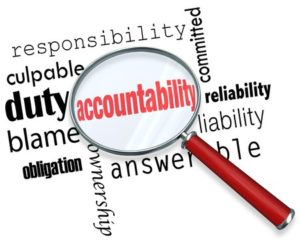By Rose O. Sherman, EdD, RN, NEA-BC, FAAN

My graduate students often ask me what they can do to stand out as leaders. I always tell them that an important quality in short supply today is personal accountability or the willingness to take ownership for one’s work and/or decisions. It is about holding yourself 100% accountable for your actions. If you are willing to do this and not engage in the “blame game” then people’s respect for you will skyrocket, others will follow you and you will feel good about yourself. To be a successful leader, you must hold yourself accountable for your actions, responsibilities and your goals. Doing this builds trust among your followers. Too often, I hear nurse leaders blame others or their “drama packed lives” for situations that are clearly theirs to own. Over time, this can become a pattern of behavior.
Todd Smith, author of the blog Little Things Matter, suggests that there are 3 key areas that a leader needs to hold him or herself accountable. These include:
Your actions and choices
- The way in which you communicate with others
- How you spend your time
- Your behavior and manners
- The consideration and respect you show others
- Your eating habits and exercising routine
- Your attitude and thoughts
- The way you respond to challenges
Your responsibilities
- Returning calls, emails, and texts in a timely manner
- Being on time for business and personal appointments
- Keeping your home, car, and workplace clean
- Spending less than you earn
- Doing the things you agreed to do when you agreed to do them
- Executing your job description to the best of your ability
- Writing things down on a “To Do” list so you don’t forget
Your Goals
- Fitness and health targets
- Financial goals
- Family objectives
- Career ambitions
- Personal goals
- Your marriage and personal relationships
- Any other goals you have set for yourself
Nurse leaders frequently talk today about the need to establish a culture of ownership on their units and in their departments. I am not sure how this can ever happen unless the culture begins with the leaders. This means holding yourself accountable for your own commitments and responsibilities. It’s doing what you know you should do, when you should do it. It is a willingness to acknowledge when you have made a bad decision or failed to act in a way expected of a leader. When you’re personally accountable, you take ownership of situations that you’re involved in. You see them through, and you take responsibility for what happens – good or bad. You don’t blame others if things go wrong. Instead, you do your best to make things right.
© emergingrnleader.com 2016


 LinkedIn
LinkedIn Instagram
Instagram